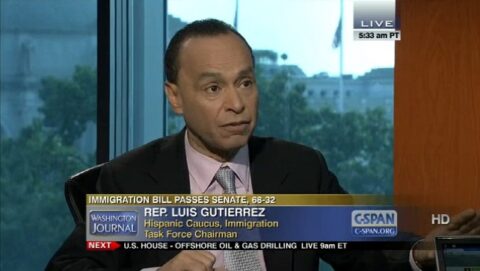Reform

The Immigration Debate Could Use a Healthy Dose of Facts
Immigration is sure to be a hot topic when Members of Congress meet their constituents face-to-face during the upcoming summer recess. The full Senate has passed a comprehensive immigration reform bill that includes a controversial “border surge” as well as a path to citizenship for unauthorized immigrants already living in the United States; the House Committee on Homeland Security has passed an enforcement-only border bill that doesn’t even acknowledge the other components of immigration reform; and there continues to be much heated public debate about what the House will do next and whether the reform effort will survive the vagaries of partisan politics. As politicians and voters attempt to wade through all of the thorny issues that are raised by the topic of immigration reform, and as journalists attempt to report on these many complex issues, there is something which should be kept front and center: facts. Read More

Steve King’s Tall Tales About Immigrants and Crime Don’t Add Up
There is no denying that Rep. Steve King (R-IA) has a vivid imagination. As he sits in Border Patrol vehicles at night, he apparently sees hundreds of DREAM Act-eligible drug mules with muscular calves hauling heavy loads of marijuana across the border. How does he know these drug mules would meet the rather stringent criteria for legalization under the DREAM Act? Hard to say. How does he know these drug mules outnumber their valedictorian counterparts by a ratio of one hundred to one? No one can say. What is certain is this: when it comes to the topic of immigration and crime, nativists like King have no need for facts when there is so much fear and innuendo at their disposal. Perhaps this is because the facts are so stacked against them. Read More

Hearing Highlights Similarities Between Senate Immigration Bill and House Border Bill
Ostensibly, the July 23rd hearing of the House Homeland Security Subcommittee on Border and Maritime Security was about the many differences between the Senate’s immigration-reform bill and the House’s border-enforcement bill. The hearing was even titled “A Study in Contrasts: House and Senate Approaches to Border Security.” However, while highlighting very real differences between the House and Senate approaches to immigration reform, the hearing inadvertently shed light on the many similarities between the two when it comes to border security. Both pieces of legislation embrace possibly unworkable border-enforcement goals that have more to do with unauthorized immigration than with the primary threats to border security: the transnational “cartels” that smuggle people, drugs, guns, and money in both directions across the border. Read More

Opposition Builds To Limited Proposal That Would Offer Citizenship Only To DREAMers
So far, House leaders have considered providing an opportunity for citizenship only to undocumented immigrants who arrived in the U.S. as children, often known as DREAMers. Majority Leader Eric Cantor (R-VA) and Judiciary Committee chairman Bob Goodlatte (R-VA) confirmed earlier this month that they are working on a bill, called the KIDS Act, to create a road to citizenship for some DREAMers. "These children came here through no fault of their own and many of them know no other home than the United States,” Goodlatte said in a statement. Read More

Immigration Reform an Imperative for Cities and Metropolitan Areas
Metropolitan leaders from around the country made the case for immigration reform at an event hosted by the Brookings Institution’s Metropolitan Policy Program today. Over 80 percent of the U.S. population, including 95 percent of immigrants, now live in metropolitan areas; cities and towns across the country therefore have a huge stake in passing immigration reform. In fact, panelists agreed that comprehensive immigration reform is an imperative for metropolitan areas. “We need an immigration system that is keeping with the times,” stated Audrey Singer, a Senior Fellow with Brookings. Read More

Faith Groups Make The Religious Argument For Immigration Reform
As the focus on immigration reform turns to the House of Representatives, faith leaders continue to push for members of Congress to support a comprehensive measure to improve immigration policies. In late May, evangelical groups launched a $250,000 national ad campaign that featured pastors urging people to support congressional immigration reform efforts. And after the Senate passed S. 744, four religious organizations sent letters to House members pushing them to act on comprehensive immigration legislation. Read More

New Estimates of State and Local Taxes Paid by Undocumented Immigrants
Undocumented immigrants who live and work in the United States pay billions of dollars in taxes every year to state and local governments. Given the chance to earn legal status, they would pay even more. Those are the simple yet powerful conclusions of a new study by the Institute on Taxation and Economic Policy (ITEP). According to ITEP, “undocumented immigrants paid an estimated total of $10.6 billion in state and local taxes in 2010.” Moreover, “allowing undocumented immigrants to work in the United States legally would increase their state and local tax contributions by an estimated $2 billion a year.” In short, legalization pays. Read More

White House Report Outlines the Economic Benefits of Immigration Reform
As Republicans in the House of Representatives search for a way forward on immigration reform, they should keep in mind a critical point: overhauling the U.S. immigration system would help jump start the sluggish U.S. economy. In other words, any Member of Congress who has expressed a desire to cut the federal budget deficit, create new jobs and businesses, boost wages, and increase U.S. economic output should be for immigration reform—not against it. Conversely, those who stand against reform should carefully consider the price that will be paid by the U.S. economy, and U.S. workers, if reform does not occur. Read More

The Civics Lessons Many Undocumented Immigrants Have Already Learned
If the Senate’s comprehensive immigration reform bill becomes law, many undocumented immigrants who apply for and become Registered Provisional Immigrants (RPIs) would have to pass an English and civics test before becoming Lawful Permanent Residents (LPRs). These tests are administered so New Americans can show their commitment to this country by demonstrating that they speak English and understand the basic tenets of our democracy. Although the test is a formal set of questions about American democracy—How many branches of government? Who was the first President? What is the Declaration of Independence?—the work leading up to passage of the Senate bill was itself a lesson in democracy. For many immigrants who may one day be RPIs, their participation in efforts to pass legislation shows that they have already participated in their first civics lesson. Read More

Spotlight Moves to House After Senate Approves Immigration Bill
Now that the Senate has passed a sweeping measure to improve U.S. immigration policies, the attention turns to the House of Representatives, where it is unclear exactly when or how they will take up an immigration bill. The Associated Press reported that President Obama called House Speaker John Boehner (R-OH) and House Minority Leader Nancy Pelosi (D-CA) after the Senate vote to urge them to have the House act on an immigration bill. Earlier this week, Boehner said the House would not take up S. 744 and would do its own bill instead. If the House passed a separate immigration measure, then a conference committee with members from both chambers would meet to reconcile the differences. Read More
Make a contribution
Make a direct impact on the lives of immigrants.
